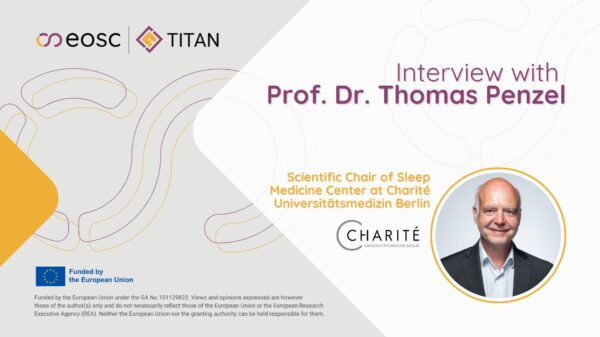Funded by the European Commission, TITAN (Trusted envIronments for confidenTiAl computiNg and secure data sharing) it’s a 36-month project that will deliver an open-source software platform focused on enabling secure sensitive data sharing, and demonstrate them in the EOSC ecosystem.
Charité University Hospital, one of Europe’s largest hospitals, is a vital partner in the TITAN project. With four campuses across Berlin, Charité is home to numerous specialized departments, including its renowned Interdisciplinary Sleep Medicine Centre. This centre stands out as one of Germany’s few facilities dedicated to examining and treating all types of sleep disorders across the entire lifespan, from childhood to old age.
We recently spoke with Prof. Dr. Thomas Penzel, Scientific Chair of the Interdisciplinary Sleep Medicine Centre at Charité and a TITAN-EOSC Partner. He shared his expert perspective on the critical role of secure and ethical data utilisation in sleep medicine research, and how TITAN-EOSC will significantly enhance these capabilities for groundbreaking discoveries.

What made Charité University Hospital want to be a part of the Titan project?
We are collecting medical data from different sources, such as hospital reports, sleep center recordings, home sleep recordings, and wearables, which we want to combine and therefore need safe data encryption.
With your expertise in sleep medicine and access to extensive clinical data, what specific contributions does aim to bring to the research and development aspects of the TITAN project?
Our expertise is in sleep medicine and in working with data in various formats, such as DICOM, HL7, EDF, CSV, and standard reports such as PDF, MS word and compile them in hospital information systems (HIS) and the electronic health care record (EHR).
Given the sensitive nature of patient data, how will Charité University Hospital ensure that privacy and ethical standards are rigorously met when this data is used within the TITAN project?
We take care to use data on which patients gave consent for research purposes. In addition to the patient consent, we take care that ethics committee agreed on sharing data in a pseudonymonized way. All personal identifiable information will be removed before sharing the data.
From a clinical perspective, how will Charité University Hospital contribute to making sure that the TITAN project Solutions are safe, effective, and ethically sound for real world medical use?
We make sure that the solutions are safe, effective, and ethical sound by our long standing experience in clinical studies, by consulting the institutional ethics board, by consulting our medical informatics infrastructure where needed.
What long-term impact do you see the TITAN project having on Healthcare, especially in how medical data is used for research and patient care?
The long-term impact will be both for sleep medicine, and other medical devisions, because our data approach is generic to many applications like intensive care monitoring, like home recording of ECG or blood pressure, like wearables in diabetes, or psychiatric disorders.
If you had to describe the project in a few words, what would it be?
Interdisciplinary
“Data encryption and developing the European health care cloud will promote optimal health care for future challenges.”
👉 Follow TITAN today and be up to date with all the project’s developments.
👉 Join TITAN’s community on X (@titan_eosc) & on LinkedIn (@titan-eosc)